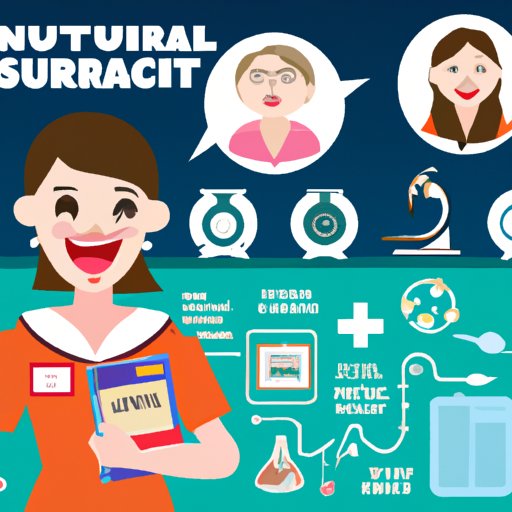Introduction
Nursing is an important career field that requires a great deal of knowledge and expertise. To become a successful nurse, it is essential to have a thorough understanding of the science behind the profession. Science classes are an integral part of any nursing program, providing students with the necessary knowledge and skills to succeed in their chosen career. In this article, we will explore the science classes needed for nursing, as well as the benefits that these classes can provide.

Examining the Core Science Classes for Nursing Programs
When considering the science classes needed for nursing, it is important to understand the role of science in nursing education. Science has always been an integral part of nursing, providing students with the knowledge and skills necessary to practice safely and effectively. The science classes required for nursing programs include anatomy and physiology, chemistry, biology, microbiology, pharmacology, nutrition, and health assessment.
It is also important to understand the requirements of science courses for nursing. Depending on the program, these courses may be offered at different levels, such as introductory, intermediate, or advanced. Additionally, some programs may require additional science classes, such as biochemistry or genetics. It is essential to research the specific requirements of each nursing program to ensure that all necessary classes are taken.

Analysing the Most Common Science Classes for Nursing Students
Anatomy and physiology are two of the most common science classes for nursing students. These courses provide students with a comprehensive understanding of the structure and function of the human body. By studying anatomy and physiology, students learn how to assess and treat patients, as well as how to recognize and manage various medical conditions.
Chemistry is another key science class for nursing students. This course provides students with an understanding of the chemical processes that occur in the body. Chemistry classes also teach students how to interpret laboratory results, which is an essential skill for nurses. Additionally, chemistry classes often include topics on pharmaceuticals and medications, which are essential for nurses to understand.
Biology is also an important science class for nursing students. This course provides students with an understanding of the structure and function of living organisms. Biology classes also teach students about the principles of genetics, which is essential for nurses to understand in order to provide appropriate patient care.
Microbiology is another essential science class for nursing students. This course provides students with an understanding of the microbial world, including bacteria, viruses, and parasites. Microbiology classes also teach students how to identify and treat infectious diseases, which is an important skill for nurses.
Pharmacology is another common science class for nursing students. This course provides students with an understanding of the action and effects of drugs on the body. Pharmacology classes also teach students how to safely administer medications, which is an essential skill for nurses.
Finally, nutrition is an important science class for nursing students. This course provides students with an understanding of the role of nutrition in health and disease. Nutrition classes also teach students how to assess and counsel patients on nutritional needs, which is an essential skill for nurses.
Discovering the Advantages of Science for Nurses
Taking science classes for nursing provides numerous benefits. By taking science classes, nursing students gain a comprehensive understanding of the scientific principles behind the profession. Additionally, taking science classes helps to prepare nursing students for the real-world demands of the profession, as they gain the skills and knowledge necessary to provide quality patient care.
Furthermore, taking science classes can help nursing students to develop critical thinking skills. Science classes often involve problem-solving activities, which help to develop and hone critical thinking skills that are essential for nurses. Additionally, taking science classes can improve nursing students’ confidence, as they gain a greater understanding of the profession and its complexities.
Conclusion
In conclusion, science classes are an essential part of any nursing program. Taking science classes can provide numerous benefits to nursing students, including an increased understanding of the scientific principles behind the profession and the development of critical thinking skills. Additionally, science classes can help to prepare nursing students for the real-world demands of the profession. For these reasons, taking science classes is an important component of any nursing program.
(Note: Is this article not meeting your expectations? Do you have knowledge or insights to share? Unlock new opportunities and expand your reach by joining our authors team. Click Registration to join us and share your expertise with our readers.)
